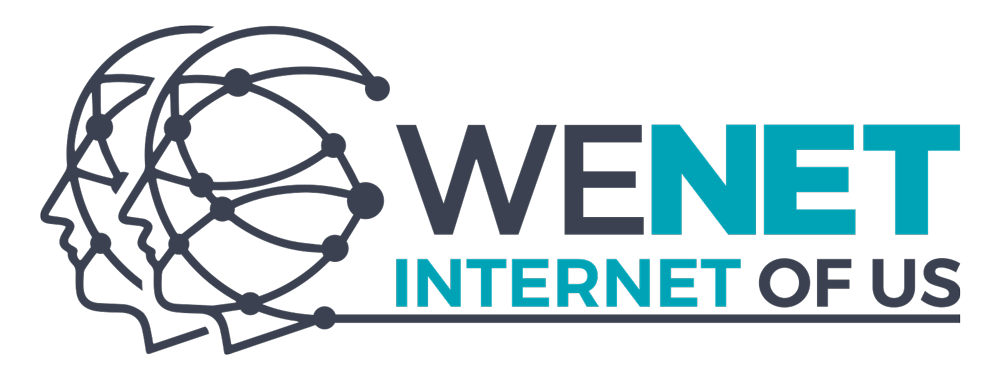AI and Diversity: The role of the human factor
On 19 April 2023, the Department of Sociology and Social Research of the University of Trento hosted a panel on AI and diversity, within the framework of the 15th edition of ICT Days, organised by WeNet Project in collaboration with U-Hopper and the Department of Information Engineering and Computer Science and sponsored by the Trentino AI consortium.
The event was attended by over 100 participants, who engaged in a lively debate on the impacts of Artificial Intelligence (AI), and in particular generative AI, symbolised by ChatGPT, on the way the development of this technology is impacting the way we work and our everyday life.
The debate among the guests focused on the implications of the coexistence of AI, diversity and inclusion. In particular, experts discussed some solutions, both conceptual and practical, to address these issues, showing how the human factor should play an important role in steering Artificial Intelligence towards a more equitable and inclusive future. While the benefits that AI can bring are undeniable, it is important to recognise the impact it has on society and, in particular, on diversity, understood as an inescapable characteristic of our ‘being human’.
Luca Melchionna, journalist and president of Machineria – and panel moderator for the event – opened the debate by recalling how what we are seeing now at the level of technological innovation in the field of AI is an intermediate point along a trajectory that began decades ago and whose evolution is still to be written.
According to Fausto Giunchiglia, CS Full Professor at the University of Trento and WeNet Project Coordinator, “ChatGPT represents a discontinuity, a black swan that will change the world. It will undoubtedly automate many activities, and we will lose jobs, but at the same time it will create new opportunities. And it will be up to us to know how to exploit them. In any case, we must always remember that without us, without our contributions and especially without our data, ChatGPT could not function.”
Micaela Verucchi, Perception Engineer at Hipert, a start-up based in Modena, commented on applications in the automotive field, where predictive AI is an enabling technology for various applications and use cases, including autonomous driving. “If autonomous driving in the road environment is a topic on which a bubble of perhaps excessive expectations is deflating, we should not forget how AI can contribute to a more inclusive mobility, making it possible, for example, for people with reduced mobility to access sites and experiences. Generative AI, on the other hand still has limited applications in this field, and mostly focused on technical aspects”.
Ettore Turra – Head of Healthcare at Jakala – spoke instead about the applications of AI in healthcare and personal services. “The ability of AI, and machine learning in particular, to support medical personnel in reconstructing the diagnosis of a disease from symptoms is now recognised as undisputed at all levels. AI’s ability to automate repetitive and recurring, and often low value-added, tasks can also help fighting, at least in part, the problems created by the shortage of medical and nursing staff. Applications of generative AI are still in a primeval stage, but it is a topic that can have big repercussions, always with a view to supporting staff in doing their jobs more effectively and efficiently, without ever losing sight of the human factor.”
Elisa Ricci, Head of the Deep Visual Learning research group at the Fondazione Bruno Kessler and Associate Professor at University of Trento’s DISI, spoke about the developments in the field of AI at a scientific level, and in particular in regards to multimedia systems (images, video, audio). “It is frighteningly beautiful,” Ricci said, “that we have reached the point where we have artificial intelligences that are able to train other artificial intelligences. It is probably a point of no return on a technical-scientific level, but it is also a phenomenon that requires governance mechanisms.”
Nicola Arpino showed how ChatGPT has reached a level of knowledge that allows it to correctly answer some of the questions in the Turing test (a test designed by the English mathematician Alan Turing to discern whether one is interacting with a human being or an AI), and showed how ChatGPT would answer some of the questions posed by moderator Luca Melchionna. Asked directly about applications in healthcare, ChatGPT itself admits that it will not be able to replace doctors, even in the distant future, as an AI will not be able to replace the human factor in the human-patient relationship. But – as Melchionna pointed out as a response – “is it even safe to believe everything that ChatGPT says?”
The panelists then returned to the problem of data, the real engine of all AI systems. Giunchiglia emphasised the importance of controlling access to data, and how AI applications, on a practical level, are limited by AI’s ability to correctly understand and interpret the diversity and complexity of the world around us. Another theme that emerged, at the level of AI governance, concerns the problem of human biases, and how these can percolate, through data, into AI systems, leading to behaviour that is distorted or at least not in line with a value system that underpins our society.
Chiara Maule, Council member for Social, Family and Housing Policies at the Municipality of Trento, spoke of how AI can represent a sort of ‘superpower’ precisely for the most fragile and disadvantaged categories. There remains, however, a problem of accessibility: to be truly inclusive and ‘democratic’, technologies, and AI in particular, must be designed taking into account the capabilities, but also the limitations of the entire public of possible users. “There also remains the problem of communicating technology, or rather the benefits that technology can provide, in a clear and accessible way. And obviously one of the tasks of the public administration is to support people in difficulty so that everyone can benefit from the advantages of technology.” Maule then went on to talk about the automation, via AI, of a number of repetitive tasks and jobs, and how this can pose a risk: “we risk excluding a not insignificant part of society from the labour market – and we must not forget that work is also a means of identity development, and allows people to gain their own role in society.”
Melchionna wrapped the panel up with a closing thought, that can be seen as a wish for the future: “the ideal direction to take entices greater sensitivity towards users – including non-digital natives – on the part of technologists and researchers, less technophobia on the part of regulators, and a shared governance system to co-design the future of AI, companies, research centres and civil society representatives together”.
The full-length recording of the event is available here below (for Italian speakers):





